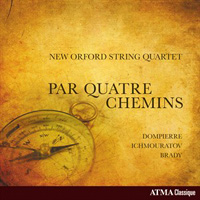FRANÇOIS DOMPIERRE (b.1943): Par quatre chemins, TIM BRADY (b.1956): Journal (String Quartet No. 2), AIRAT ICHMOURATOV (b.1973): String Quartet, Op. 35 No. 4.

Catalogue Number: 03T066
Label: Atma
Reference: ACD2 2740
Format: CD
Price: $16.98
Description: Three very engaging quartets, rather different but all tonal and instantly accessible. Dompierre frequently incorporates elements of 'light' music and jazz into his immensely enjoyable compositions - see also 10S092 and 11O079 - without sacrificing their thoroughly 'classical' craftsmanship. The first movement of his quartet is based on a hornpipe, with an appropriately Irish-folky feel. The second is a lament which suddenly breaks into a sultry dance in its central section, before succumbing to despair and finally, resignation. As though to say 'it's not that bad really', the following movement is an elegant, slightly trivial waltz, and the one after that, an elegant pavane with a touch of sentimentality. The finale, which sounds like a typical Romantic scherzo-finale is actually a set of variations on ’What a Wonderful World'. Ichmouratov's 4th Quartet is the most conventionally neo-romantic piece here, and in some ways the most satisfying. The work has an in memoriam subtext, and the idea of 'time and fate' recurs throughout in the form of mechanically ticking rhythms, but not in the modernistic sense that one might expect of a quartet written in 2012; more in the nature of Beethoven's metronome in the 8th Symphony. Ichmouratov's scherzo is in fact a 'metronomic' waltz. The slow movement is the tragic heart of the piece, an eloquent, sorrowful lament. Particularly in the restless, driven outer movements there is a strong sense of the Canadian-domiciled composer's Russian origins (via the usual suspects including but by no means limited to, Shostakovich). Brady's piece is the least conventional; like our previous offering (09R075) it draws on his experimental background but in an individual, approachable idiom not exactly related to, but recalling the 'Bang on a Can' composers, with their post-minimalist, rock-acknowledging driving rhythms. If you like David Lang, you'll definitely like this. The piece alternates driving, motoric sections in which the quartet is used rhythmically and percussively, with limited pitch material, and fluid, sonorously plastic episodes. New Orford String Quartet.
